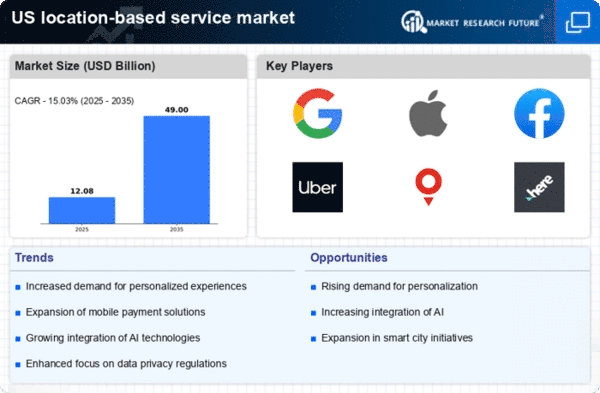Expansion of Mobile Device Usage
The proliferation of mobile devices significantly influences the location based-service market. As of November 2025, approximately 85% of the US population owns a smartphone, facilitating the widespread adoption of location-based applications. This trend is further supported by the increasing availability of high-speed internet and advancements in GPS technology. Mobile devices serve as essential tools for accessing location-based services, enabling users to find nearby restaurants, shops, and services with ease. The convenience offered by these applications is likely to drive user engagement and increase the overall market size. Analysts project that the mobile segment of the location based-service market will grow at a CAGR of 15% over the next five years, reflecting the growing reliance on mobile technology.
Growth of Smart City Initiatives
The location based-service market is poised for growth due to the rise of smart city initiatives across the US. Urban areas are increasingly adopting technologies that enhance connectivity and improve the quality of life for residents. These initiatives often incorporate location-based services to optimize traffic management, public transportation, and emergency response systems. For example, cities are deploying smart traffic lights that adjust based on real-time traffic data, improving flow and reducing congestion. As municipalities invest in these technologies, the demand for location-based services is expected to increase. By 2026, it is anticipated that smart city investments will exceed $100 billion, creating substantial opportunities for businesses operating within the location based-service market.
Integration of Artificial Intelligence
The integration of artificial intelligence (AI) into the location based-service market is transforming how businesses interact with consumers. AI technologies enable more accurate location tracking and data analysis, allowing companies to deliver real-time, context-aware services. For instance, AI can enhance navigation applications by providing users with optimal routes based on current traffic conditions. Furthermore, AI-driven chatbots can assist customers in finding nearby services, improving user experience. As AI adoption continues to rise, it is projected that the market for AI-powered location services will grow by 25% annually through 2028. This growth indicates a significant shift in how businesses leverage location data to enhance service delivery.
Rising Demand for Personalized Services
The location based-service market experiences a notable surge in demand for personalized services. Consumers increasingly expect tailored experiences based on their geographical location. This trend is driven by advancements in data analytics and machine learning, which enable businesses to offer customized promotions and recommendations. For instance, location-based marketing strategies can enhance customer engagement, leading to higher conversion rates. In 2025, it is estimated that 70% of consumers prefer brands that provide personalized experiences, indicating a significant opportunity for businesses in the location based-service market. Companies that leverage location data effectively can enhance customer loyalty and drive sales, thereby solidifying their position in the competitive landscape.
Increased Focus on Location-Based Advertising
The location based-service market is witnessing an increased focus on location-based advertising as businesses seek to engage consumers more effectively. Advertisers are increasingly utilizing geolocation data to target potential customers with relevant promotions based on their current location. This strategy not only enhances the effectiveness of marketing campaigns but also improves return on investment. In 2025, it is estimated that location-based advertising will account for 30% of total digital advertising spend in the US. This shift indicates a growing recognition of the value of location data in driving consumer behavior. As businesses continue to invest in targeted advertising strategies, the location based-service market is likely to expand, offering new opportunities for innovation and growth.

















Leave a Comment